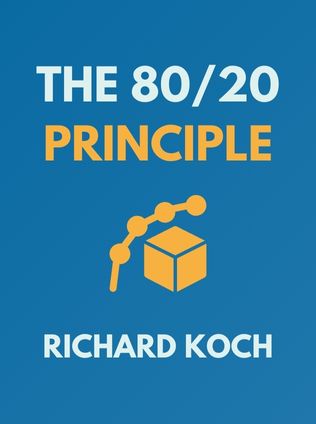
The 80/20 Principle
The Secret to Achieving More with Less
By Richard Koch
Published 01/1997
About the Author
Richard Koch is a renowned British author, entrepreneur, and former management consultant who has profoundly impacted the world of business and personal development. He is best known for popularizing the 80/20 Principle, also known as the Pareto Principle, which he explored in depth in his seminal work, The 80/20 Principle: The Secret to Achieving More with Less. Koch's background is rooted in the corporate world, where he worked as a management consultant at the prestigious Boston Consulting Group and later co-founded the consulting firm LEK. His experiences in these high-pressure environments shaped his understanding of efficiency and effectiveness, which are central themes in his writings.
Throughout his career, Koch has authored several best-selling books, including The Power Laws, Living the 80/20 Way, and Unreasonable Success and How to Achieve It. His work extends beyond writing; he is also a successful investor, having played a key role in the growth of businesses such as Filofax, Plymouth Gin, and Betfair. Koch’s ability to distill complex concepts into practical advice has made his books popular among entrepreneurs, executives, and anyone interested in maximizing their potential.
Main Idea
The central idea of The 80/20 Principle is the concept that 80% of outcomes often come from 20% of efforts, inputs, or causes. This idea, rooted in the observations of the Italian economist Vilfredo Pareto, has broad applications in both business and personal life. Koch argues that by identifying and focusing on the most impactful 20%, individuals and organizations can achieve significantly better results with less effort. This principle, when applied correctly, can lead to greater efficiency, increased profitability, and enhanced personal fulfillment.
Koch's book is a guide to harnessing the power of the 80/20 Principle in various aspects of life. He provides readers with the tools to identify the critical few activities, relationships, and strategies that drive the majority of their success and happiness. By doing so, Koch believes that anyone can achieve more with less, freeing up time and energy for the things that truly matter. His approach is both practical and transformative, offering a new perspective on how to live and work more effectively.
Table of Contents
- Introduction to the 80/20 Principle
- Understanding the 80/20 Principle
- Applying the 80/20 Principle in Business
- Applying the 80/20 Principle in Your Personal Life
- The Mindset Shifts Required to Maximize the 80/20 Principle
- Practical Applications and Strategies
- Challenges and Criticisms
- Conclusion: The Power of Focus
Introduction to the 80/20 Principle
The 80/20 Principle, also known as the Pareto Principle, is a powerful concept that reveals the imbalance between inputs and outputs. This principle was first observed by Vilfredo Pareto, who noticed that 80% of the wealth in Italy was owned by 20% of the population. Over time, this principle has been found to apply in many other areas, from business to nature. In The 80/20 Principle, Richard Koch explains how this principle can be used to achieve more with less effort in both business and personal life.
Koch's approach to the 80/20 Principle is both practical and actionable. He begins by helping readers understand that this principle is not just a theoretical concept but a practical tool that can be applied in everyday life. By identifying the 20% of activities, clients, or products that generate 80% of results, individuals and businesses can focus their efforts more effectively, leading to greater success and satisfaction. This concept challenges the conventional wisdom that hard work alone leads to success, suggesting instead that smart work—focusing on the most important tasks—yields far better results.
“The 80/20 Principle is not a magic trick or a quick fix, but a profound insight into the nature of reality. It’s about focusing on what really matters and letting go of what doesn’t.” — Richard Koch
Understanding the 80/20 Principle
At its core, the 80/20 Principle is about recognizing the uneven distribution of results in almost every aspect of life. Whether it's business revenue, personal relationships, or daily tasks, a small fraction of causes typically leads to the majority of effects. Koch emphasizes that this principle is universal, appearing in economics, science, health, and even in our daily routines. Understanding this principle allows individuals and organizations to concentrate their efforts where they will have the most significant impact.
Koch provides numerous examples to illustrate this point. For instance, in many businesses, 20% of products often generate 80% of revenue. Similarly, 20% of customers might account for 80% of sales. Recognizing these patterns allows businesses to allocate resources more effectively, focusing on the areas that drive the most value. In personal life, this principle might manifest as 20% of activities providing 80% of happiness or 20% of relationships contributing 80% of personal fulfillment.
Sign up for FREE and get access to 1,400+ books summaries.
You May Also Like
The Subtle Art of Not Giving a F*ck
A Counterintuitive Approach to Living a Good Life
By Mark MansonRich Dad Poor Dad
What the Rich Teach Their Kids About Money - That the Poor and Middle Class Do Not!
By Robert T. KiyosakiHow To Win Friends and Influence People
The All-Time Classic Manual Of People Skills
By Dale CarnegieQuiet: The Power of Introverts
The Power of Introverts in a World That Can't Stop Talking
By Susan Cain



















